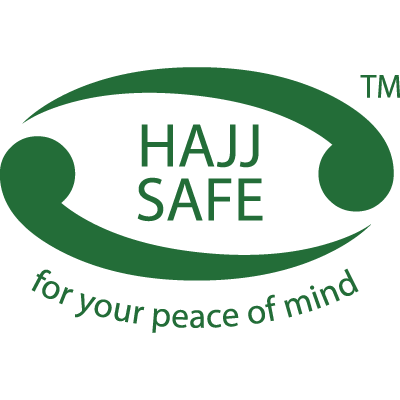GUIDE TO A SAFE AND HEALTHY HAJJ or UMRAH
The aim of this booklet is to assist pilgrims in preparing for Hajj or Umrah and to explain what Health and Safety issues pilgrims traveling to Saudi Arabia should be aware of.
Health and Safety issues that pilgrims travelling to Saudi Arabia should be aware.
Every year over two million Muslims perform Hajj and Umrah and the numbers are continuing to grow. Millions of people converge from all over the world to one place on Earth to perform their pilgrimage.
Hajj is a test of endurance and patience, and pilgrims face health hazards due to environmental factors as well as due to the sheer number of people gathered in one place
The mass migration during the Hajj is unparalleled in scale, and the extreme congestion of people and vehicles during this time amplifies health risks, such as those from infectious disease, which vary each year.
As with any travel to different climates and environments abroad, the Hajj can expose pilgrims to disease and health risks; therefore, it is important to be aware of the dangers and how to stay healthy.
Since the Hajj is dictated by the lunar calendar, which is shorter than the
Gregorian calendar, it presents public health policy planners with a moving target, demanding constant preparedness. The authorities of the Kingdom of Saudi Arabia do their utmost to ensure the safety and health of all pilgrims, but pilgrims themselves must also take some necessary precautions to ensure they complete their pilgrimage safely.
The aim of this booklet is to assist pilgrims in preparing for Hajj or Umrah and to explain what Health and Safety issues those travelling to Saudi Arabia should be aware of. Much of the advice concerns simple but effective measures which can be taken to greatly reduce the risk of ill health.to ensure they complete their pilgrimage safely.
The following is a guideline and must be accompanied by your own Doctor's advice pertaining to your own health needs.
[1] Above Image: The Holy KA’BA - Thousands of people circling the holy ka’ba (tawaf) at the same time.
This booklets includes information on Health & Safety:
1. Before you go to Hajj or Umrah
2. During your travel to Saudi Arabia
3. When you arrive in Saudi Arabia
4. During your Hajj/Umrah.
5. What to do when you arrive back home. You will also find:-
6. Useful contacts and numbers to be aware of.
Introduction to Hajj
Hajj is mandatory for all Muslims who have the means, both financial and physical, to undertake the journey.
Amr ibn al-‘Aas (RA) stated: The Messenger of Allah (SAWS) said: “Hajj wipes out whatever sins came before
it” (N Stated by Amr ibn al-‘Aas (RA), narrated by Muslim), and to assist in gaining such great reward, it is essential that the pilgrim is prepared both spiritually and physically. Good health makes it possible to make the most of such a great opportunity by enabling the pilgrim to perform as much worship as possible.
As the Hajj journey is physically and mentally demanding, a lack of preparation is likely to have an adverse effect on the body, and may even result in having a negative impact on the pilgrim’s experience.
To address these issues, there are precautions that can be taken to ensure the pilgrim’s physical and mental well-
being throughout the journey. Therefore, this booklet provides information on how to prepare for and stay fit and healthy during Hajj. Following ; such advice will no doubt improve the pilgrim’s experience.
Before you go for Hajj or Umrah
The following contains guidelines on how to prepare for Hajj. , and tThese must be accompanied by your own doctor's advice pertaining to your personal health needs. It may also be necessary to consult a religious scholar about certain religious issues.
1. Check the Foreign and Commonwealth Office travel advice to make sure that you are up to date with the situation in Saudi Arabia at: www.fco.gov.uk/travel or by calling 0845 850 2829.
2. Book your tickets through an ATOL registered tour operator (for further information, go to www.atol.org.uk) as, for example, many fraudulent companies have been set up. It is possible to protect yourself and your loved ones by booking tickets through a reputable company that is registered with ATOL.
3. Purchase travel insurance for your journey- Shariah compliant insurance policies are available.
4. Ensure that your passport is in good condition with at least six months left after returning home , and that the required visas are in place.
5. Take a copy of your passport, insurance policy, emergency numbers and ticket details , and lLeave the copies, along with your itinerary and contact details, with a family member or friend.
6. If you or a family member takes regular medication, be sure to pack enough for the duration of the pilgrimage. Medication should be clearly labelled with the individual’s name, and it is important to take a list of all medication, how often it needs to be taken, and what the medication is for.
7. It is essential to ensure that pre-existing illnesses such as diabetes or high blood pressure are under control prior to the pilgrimage, so be sure to book a checkup with your GP well in advance.
8. Visiting the dentist and optician for a checkup prior to the journey is also recommended so that any treatment can be carried out before embarking on Hajj or Umrah.
9. Ensure that you take good quality footwear as you will need to walk long distances. Any footwear to be used for Hajj, including slippers, must be worn in before the journey to soften the straps and reduce the risk of discomfort and blisters.
10. Carry a bag with you to place footwear in during the prayers, as footwear can easily be stolen or mistaken and having to walk barefoot may have severe consequences.
stickers both on the outside and inside of your suitcases, including your name, passport number, airline, flight number, hotel name and a contact telephone number.
11. Clearly label all luggage by placing stickers both on the outside and inside of your suitcases, including your name, passport number, airline, flight number, hotel name and a contact telephone number.
12. Secure your luggage with locks and use luggage straps, as there will be millions of suitcases and it is better if your luggage is easily identifiable from a distance and secured using locks.
13. Emergency numbers for Saudi Arabia are: Ambulance 997 Police 999 Traffic Accidents 993.
Hajj and Umrah Requirements
Meningococcal meningitis:
All pilgrims aged two years and older are required to show proof of vaccina8on against meningococcal meningi8s ACW135Y for the purposes of Hajj or Umrah. Vaccina8on is also a requirement for obtaining a visa.
This vaccine should have been received not more than three years and not less than ten days before arrival in Saudi Arabia, and should be recorded in a vaccina8on book showing the traveller’s full name. If a traveller is in possession of an Interna8onal Cer8ficate of Vaccina8on or Prophylaxis (ICVP) booklet, meningococcal meningi8s vaccine can be recorded in the ‘Other Vaccina8ons’ pages.
Meningococcal meningi8s has occurred during previous Hajj pilgrimages and has spread to other countries in associa8on with returning pilgrims. Therefore, vaccina8on is also advised for personal protec8on of all pilgrims, including those under the age of two years.
Meningococcal infec8on most commonly presents as either meningi8s or sep8caemia, or a combina8on of both. Less commonly, individuals may present with pneumonia, myocardi8s, endocardi8s, pericardi8s, arthri8s, conjunc8vi8s, urethri8s, pharyngi8s and cervici8s. For more informa8on, speak with your Doctor (GP).
VACCINATIONS
Be sure to visit your doctor four to six weeks prior to traveling to ensure enough time for vaccinations to become effective.
Make sure that you are administered the required vaccinations for Hajj, and take vaccination cards with you on your journey. Your travel agent will also need a copy.
Required Vaccinations: Meningococcal meningitis
Meningococcal meningitis is a bacterial infection that is spread through direct contact with an infected person via coughing or sneezing.
Yellow Fever - Yellow fever is a serious viral disease that is usually spread by a particular type of mosquito.
Recommended Vaccinations:
PERSONAL FIRST AID KIT
THE HAJJ SAFE FIRST AID KIT
Below is a photo of the Hajj Safe first aid kit designed specifically for pilgrims traveling for Hajj or Umrah. There simple first aid bandages, scissors, pastors etc.
It has been designed and made big enough for you to also hold your medications.
A personal first aid kit will be useful in case of minor health emergencies. The following list provides guidelines on what to include:
1. Adequate supplies of all regular medication in the original container and properly labelled.
2. A signed and dated letter from your doctor that includes all medical conditions and a list of all medication, including generic names.
3. If you wear glasses or contact lenses, take an extra pair. 4. If you have major allergies or a chronic medical condition,
wear a medical alert bracelet.
5. A small supply of common medicines for sore throats, coughs, constipation or diarrhoea.
6. Adhesive dressings, antiseptic cream, insect repellant and petroleum jelly (Vaseline).
Your first aid kit should also include, Piriton for allergies mild pain killers and something to reduce fevers, such as paracetamol.
How important is your personal physical fitness?
Prophet Muhammad (SAWS) mentioned the importance of physical fitness. The more physically fit one is, the easier it is to perform the rituals of Hajj. Hajj requires a lot of walking and it is recommended to walk as much as possible, preferably from at least six months prior
JUST FOR WOMEN

DURING YOUR TRAVEL FOR HAJJ OR UMRAH
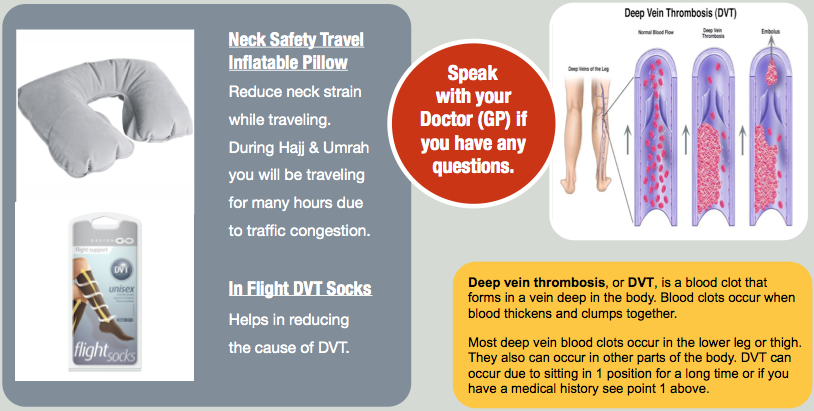
1. Seeking advice from your doctor if you have a history of heart disease, lung disease, cancer, blood clotting abnormalities, or a personal or family history of DVT, as well as if you have undergone surgery recently, received hormone treatment, or suffered a trauma involving the lower limbs.
2. Wearing loose, baggy clothing during your journey and purchasing elastic compression stockings to wear during the flight.
3. Drinkingplentyofwater during the flight.
4. Standing up and walking around the cabin every couple of hours, and performing stationary exercises such as rotating your ankles.
5. Avoiding crossing your legs while seated.
Your Arrival into Saudi Arabia.
- On arrival to Saudi Arabia airports, expect delays and waiting around. Remember millions of people are arriving, here so be patient and try not to leave the group that you are with. Get some food and drink water, to keep your energy levels high.
- On arrival to Makkah from the UK, try to rest
and have something light to eat and drink before heading off for Tawaf. Your body will be tired and will benefit from some rest before completing the Umrah. - On arriving at your hotel ask the local workers for directions to the nearest pharmacy and hospital clinic as you never know when you may need help. Healthcare during the Hajj period is free, so be aware of private clinics, which you may be directed to and which will charge and may be expensive.
- Carry ID, details of your next of kin and tour operator contact, and the hotel that you are residing in, along with any relevant telephone numbers, with you at all times.
- Pick pockets: Even at the holiest site in Islam, thieves have been known to use a knife to cut through bags to steal money or belongings. Remain aware of this and use a secure money belt or bag. (For more information visit www.hajjsafe.com).
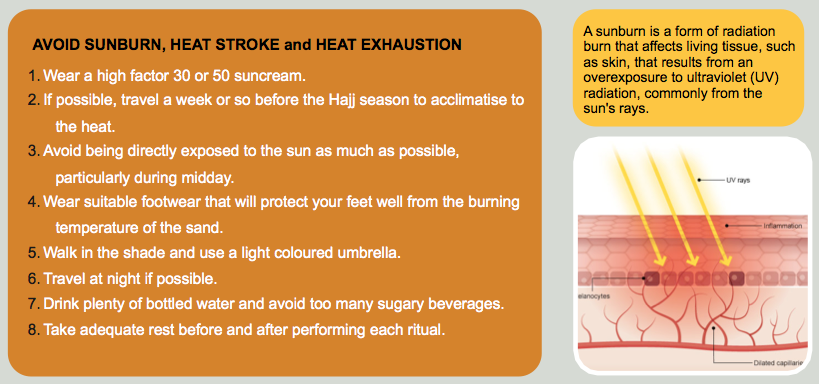
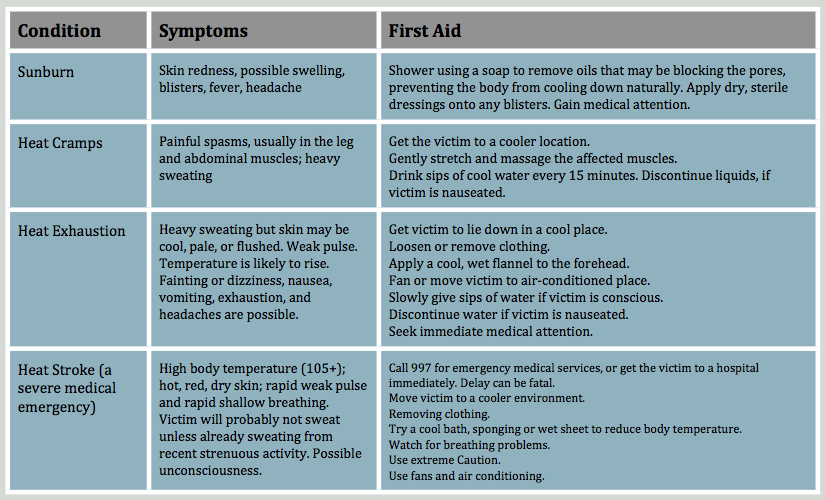
COMMON ILLNESSES
Respiratory tract infections
Acute respiratory tract infections are very common during Hajj or Umrah. Close contact between pilgrims; shared sleeping accommodation (mainly in tents), and dense air pollution all increase the risk of transmission of airborne respiratory diseases. Many pilgrims leave Hajj with ‘Hajj cough’ and whilst this normally subsides a few weeks after returning home, if it continues or worsens, seek medical advice. Tubercolis and Pertussi are other serious lung conditions that can be transmitted from person to person, particularly under such crowded conditions, therefore the Ministry of Health in Saudi Arabia recommends the wearing of surgical face masks in crowded areas.
Asthma & chest infections
Asthma should not pose a problem during Hajj and Umrah if it is well controlled. Inhalers should be used regularly as advised, and use of a surgical face mask may help with dust. Always carry your inhaler.
Smoking
Avoid smoking during whole Hajj or Umrah especially when in Ihram. This is an excellent opportunity to give up this health risk habit.
Skin Care
Because of the dry harsh conditions that may be encountered, applying a good non-perfumed moisturiser several times a day will benefit the skin and help it to acclimatise.
Just for men
Men are not allowed to wear underwear whilst in Ihram, meaning sweating and the rubbing of the thighs together may cause trouble when walking. To prevent this, men are advised to use Vaseline or another non-perfumed moisturiser liberally on the inner thighs whilst in the state of Ihram.
Diabetes
Control of diabetes should start at least two months before departure to make sure that the control is good and the correct medication is taken. A proper diabetic diet is very important. Most people will have their food included in their accommodation package, but diabetics should make their own arrangements where possible, for example, by buying brown bread and avoiding juices containing a lot of sugar.
High Blood Pressure
Visit your Doctor several months prior to Hajj so any necessary changes to medication can be made and blood pressure stabilised well before departure. If you are taking diuretics ("water tablets"), you may need to adjust the dose due to hot weather- please seek advice about this.
Diarrhoea and vomiting
In circumstances where there are large crowds, infections are likely to spread, either due to germs spread by droplets from our mouths when we speak or cough, or through direct contact such as sharing a cup or a spoon.
Avoid close contact with people who are ill; visit them but keep your distance. In the case of Diarrhea, drink plenty of extra fluid, preferably oral re-hydration salts. If it occurs more than six times in any twelve hours and is prolonged, seek medical attention.
Arthritis
Those people who suffer from arthritis in the hips, knees or ankles should attempt to lose weight if they are overweight. Obtain the advice of a Doctor or physiotherapist on how best to control the condition prior to and during Hajj. Take some form of pain killers and a Gel.
Dehydration
Dehydration happens when your body loses more fluid than you take
in. When the normal water content of your body is reduced, it upsets the balance of minerals (salts and sugar) in your body, which affects the way that it functions.
Some of the early warning signs that you're dehydrated include:
- getting headaches
- feeling thirsty and lightheaded
- having dark coloured, strong- smelling urine
- passing urine less often than usual If you're dehydrated, drink plenty of fluids. This can be water, semi- skimmed milk and diluted squash or fruit juice, but it's best to avoid fizzy drinks or caffeine if possible.
- Blisters
Most blisters are common and can be caused by:• friction to the skin• heat – for example, from sunburn or
a scald.Most blisters heal naturally, usually
between three and seven days, and don't require medical attention. However, speak to a medical professional if your blister starts weeping pus or becomes inflamed and swollen.
Cutting Your Hair
One of the rites of the Hajj is for men to have their head shaved (trimming the hair is also acceptable, although shaving of the head is preferable). Opportunistic “barbers” will shave in makeshift centres and razor blades may be used on several scalps before being discarded, creating the risk of blood borne infections such as HIV and hepatitis, especially as many pilgrims come from places where such infections are endemic. Pilgrims should have their head shaved by professionals in barber shops.
Marble Floors
The Holy Mosques in Makkah and Medina have marble floors both
Jamarat
Do not rush to stone the Shaitaan. This must be done deliberately with a lot of emotion. Wait for a suitable opportunity. Vulnerable people should be protected from the pushing and shoving. Be careful that other people do not trample on your toes or your feet. If an injury is sustained on the feet, treat with an antiseptic such as Savlon; if the wound is deep, seek medical help.
FOOD and WATER SAFETY
Inside and outside which can become slippery when wet, such as as after rain or after they have been washed. Walking on slippery floors must be done with extra care as slipping and falling hard onto the marble can cause serious injury.
- Do not overeat. Eat small regular meals and drink adequate liquid.
- Avoid eating uncovered food and buying food from street vendors.
- Avoid eating or drinking unpasteurised milk.
- Only eat thoroughly cooked food, or fruit and vegetables you have peeled yourself.
- Avoid eating cooked foods that are no longer piping hot.
- Eat a high fiber diet to avoid constipation.
- Avoid tap water, fountain drinks and ice cubes, and drink only bottled or boiled water, or carbonated drinks in cans or bottles.
- Avoid using public drinking cups as much as possible. Always carry your own cup with you.
- Avoid purchasing Zam Zam water in plastic containers sold by street vendors.
- Use your own eating utensils and do not share them.
- Use only your own soap- again, do not share.
- Please remember to take any medication on time. Before or after food as prescribed by your doctor.
- Wash your hands regularly using soap and water to remove germs after using the toilet, and before eating. Simply wiping your hands is not enough to remove germs. It is recommended to take antibacterial soap with you. It is known that spreading germs mainly occurs through touch, and therefore cleanliness can prevent the spread of many diseases.
This is a table to show possible health risks during specific religious rituals.
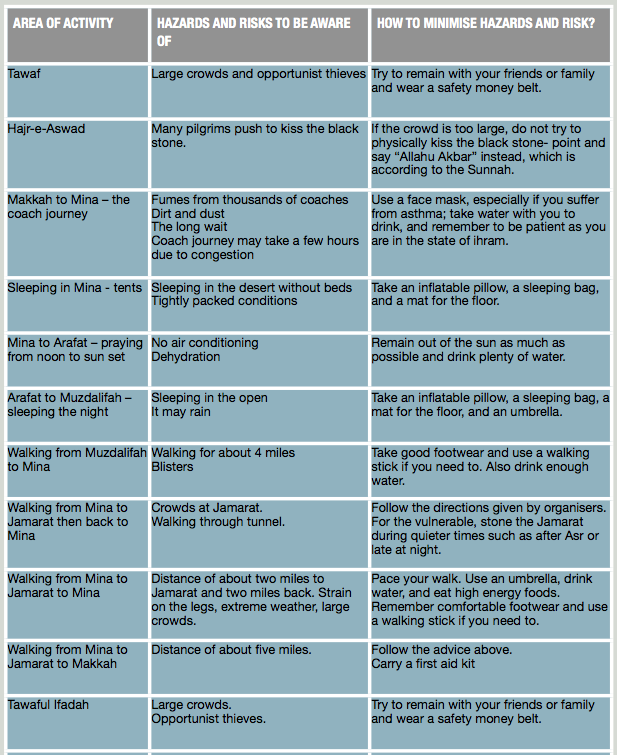
After Hajj or Umrah
If you have any health related issues, whether they are new or pre-existing illnesses that have been exacerbated, then see your GP as soon as possible on arriving home to ensure no further intervention is required. ________________________________
Emergency numbers in Saudi Arabia:
Ambulance 997 Police 999 Traffic Accidents 993
Useful Contact Information
In Saudi Arabia:
British Consulate-General, Jeddah: 02 622 5550 Fax: 02 622 6249
British Hajj Consular Delegation Elaf
Kinda Hotel PO Box 4616 Close to Abraj Al Bait Towers, King Fahad Gate, Makkah 02 574 5555 Direct fax:02 573 7557 Office Ext. 02 573 7502 Consular Staff Room Ext.
02 573 7503/7504/7505
The Ministry of Hajj info@haj.gov.sa www.haj.gov.sa
Toll Free: 8002444480 Ministry of Hajj (Makkah): 02 5571714
Ministry of Hajj (Jeddah): 02 6655811 or 02 6477551
Ministry of Hajj (Al Madinah Al Munawarah): 04 8212320 localhajj@haj.gov.sa
About Hajj Safe
Hajj Safe is dedicated to providing pilgrims with products and services that will keep themselves and their belongings safe and secure while they are on the life- changing experience of Hajj or Umrah.
Website - www.hajjsafe.com
Tel - +44 (0) 1633255269
Email - info@hajjsafe.com
HAJJ SAFE
Office 14, Orion Suite Enterprise Way, Newport South Wales, NP20 2AQ
________________________________________________________________________________
Disclaimer: This booklet is intended to assist travellers and is a guide only. You are advised to seek professional medical advice and to consult a religious scholar about issues of concern. Hajj Safe and the author will not be responsible for any adverse effects that come from acting on information that is provided in this booklet or on its website. Please advise us of any errors/commissions in this publication. © Hajj Safe.
